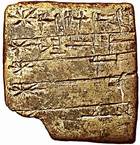“O father who begot me, why have you turned away from my city which was built (?) for you? O Enlil, why have you turned away from my Urim which was built (?) for you? The boat with first-fruit offerings no longer brings first-fruit offerings to the father who begot him. Your food offerings can no longer be brought to Enlil in Nibru. The en priests of the countryside and city have been carried off by phantoms. Urim, like a city raked by a hoe, is to be counted as a ruin-mound. The Ki-ur, Enlil’s resting-place, has become a haunted shrine. O Enlil, gaze upon your city, an empty wasteland. Gaze upon your city Nibru, an empty wasteland.
The lament for Sumer and Urim, ca. 2400 BC
In 3300 BC, Sumeria ruled supreme. Thousands worshiped its many gods in magnificent temples. And then it happened. The Empire fell, its buildings and temples destroyed.
Its sacred texts lost. Its gods forgotten.
From 3000 BC to 30 BC, Egypt ruled an Empire. Egypt lasted much longer than Sumer. One group after another contested for rule of the Kingdoms of the Nile. After Alexander conquered Egypt, the Ptolemies ruled. The last Ptolemy you have heard of: Cleopatra.
But Cleopatra was Greek. The language of Egypt was lost. By the time Napoleon came to Egypt, its gods were forgotten, its temples in ruin. None said prayers to those gods, or sung hymns to their glory.
The story repeated again and again. The Hittites, the Akkadians, the Olmecs, the Assyrians.
Abram was born around 2000 BC. So far as we know, he was the only worshiper of the God whose name was not to be spoken. In two or three centuries, his great-grandchildren numberd a few hundred. They continued to grow in number–but they were slaves. In a great irony, it was the Egyptians who enslaved them.
Around 1500 BC, Moses came on to the scene. Because many had forgotten the God of Abraham, Isaac, and Jacob, Moses began writing the history of that God’s interactions with the Earth, and with its people. Over the next 1500 years, Israel would become a regional power, would undergo civil wars, would be conquered. Its buildings and Temple destroyed–twice!— and its God. . . .not forgotten, its sacred text preserved.
Of all the ancient empire and gods, none had a smaller or more short-lived political reach than Israel, and yet, somehow, its sacred text was never lost. What we know as the Old Testament was continuously read and preserved from the first. And its God prayed to, praised, and worshiped.
Something we will revisit in a later post, some of the peoples and even gods mentioned in the Bible were forgotten. Just one notable example. For a while, secular historians attacked the credibility of the Bible because of the Hittites. Aside from the Bible, no evidence of the Hittites then existed. Now that’s irony. For a time, the only memory of the Hittites and their gods was– in the Bible.
Now, the survival of the bible and the worship of its God is not enough evidence to convince me it is the word of God, not all by itself. But when you consider all of the other sacred texts and gods whose names vanished for millennia– its strong evidence that there is something extraordinary about the Bible.
Even as greater empires, which lasted longer than Israel, and boasted greater monuments and many more worshipers than Israel’s God perished and their sacred texts disappeared, something preserved the Bible. And through all the years, through all the destruction, through conquest, slavery, and exile, somehow the worship of the God of the Bible survived.
Whether or not it’s a miracle, it’s remarkable. It’s singular. By itself, it’s not enough to make me believe the Bible is the Word of God. But it is far from the only evidence.











